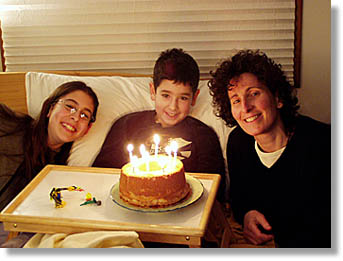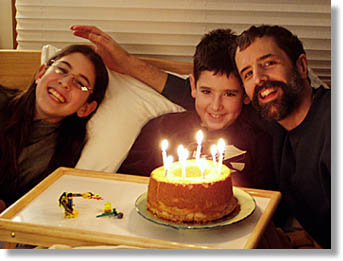| Diagnosis and Surgery | |
|
Mo began to show vague symptoms of poor appetite in the summer of 2002. In September of 2002, he complained of dizziness and nausea with sudden movements, and his medical evaluation indicated that these symptoms might be from the inner ear (vestibular). The next step was an ENT evaluation, but before we got to that workup, his symptoms progressed. A week before his diagnosis of a brain tumor, he developed headaches and intermittent vomiting in the morning. These symptoms occurred on Monday, Tuesday, and Thursday, and by Thursday his mother and his doctor became suspicious and immediately ordered an MRI for the next morning (12/20/02). The tumor in his cerebellum was discovered during the MRI and we were sent to the University Hospital for further diagnosis and treatment. Needless to say, we were in shock. At the University the doctors ordered another MRI to see if there were any tumors in his spine. Thankfully there weren't. The following day, on December 21st, he underwent brain surgery, which was very successful, with complete removal of the tumor. The pathology report on the following Friday revealed a diagnosis of medulloblastoma, which is a highly malignant tumor, almost always seen in children and young adults. There are between 400 and 500 medulloblastomas diagnosed in the US each year. On 12/28, one week after surgery, Maurice and his parents were only too happy to come home to continue his recovery. The cerebellum is the part of the brain which controls balance and coordination, and the surgery left him with some coordination issues on his right side. In particular, he needs to practice writing with his right hand and walking and he will be receiving physical and occupational therapy to assist him with recovering those skills. Not to be stopped, he has surprised us with the beautiful penmanship which flows effortlessly from his left hand!
|
|
| Good News! | |
 |
Based on Mo's age and the success of the surgery, he has an excellent chance of being cured. However, the standard treatment for medulloblastoma includes both chemotherapy and radiation. Within 10-20 days after surgery, but before treatment could begin, the doctors had to examine his cerebral spinal fluid (CSF) to make sure there were no cancer cells floating around in it. |
| If cancer cells were present in his CSF, the dosages of the radiation would've had to be higher, there would have been additional chemotherapy drugs used, and his prognosis would be less favorable. | |
| After a rather unnerving wait, Mo was given a spinal tap on 1/8/03 and we were informed that his CSF is cancer free! A sigh of relief rippled from Wisconsin to Florida, California, and beyond. Time for a celebration! |  |